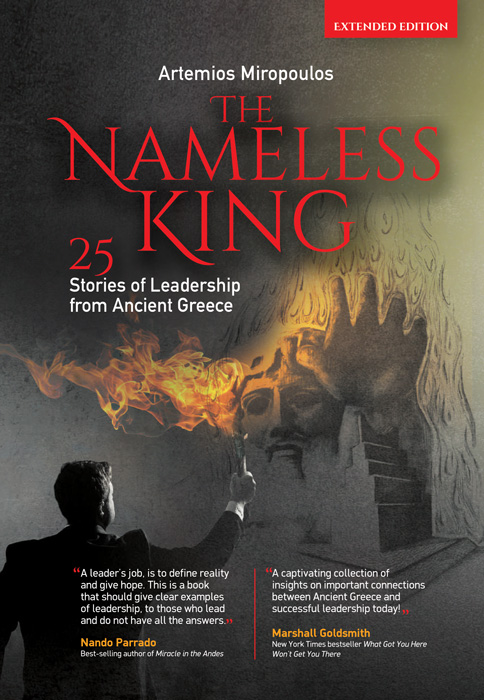The third and final part of an excerpt from The Nameless King: 25 Stories of Leadership from Ancient Greece by Artemios Miropoulos.
The thirst for power and the display of authority might dictate one’s wishes and make him feel strong and mighty but it alienates and scares people away. They don’t speak openly about things that are wrong and they avoid any action that might upset their boss. The leader then lives in a virtual reality and the end is inevitable.
When I got my first promotion and became a manager, a good friend of mine with much wider experience in positions of authority said: “Don’t be concerned about displaying the power of your rank; let your chair bear the title, you shouldn’t.” The same way film directors have their names written on the backs of their chairs, a manager or a parent should be aware that people around them, subordinates or dependent members in a family, are already aware of their power position; therefore there is no need for them to try and make this power even more visible. Bearing a senior managerial position is, on its own, a factor that distorts behaviors, and this can be the cause of awkward and unproductive relationships. A leader should try to downplay the importance of hierarchy and choose a less intimidating communication approach to guide their employees–by listening more, giving advice, expressing reason together with their own doubts and overall encouraging candor so that their subordinates find the confidence to engage openly with arguments, opinions and suggestions. This way, not only will team members be adding true wisdom to the collective outcome, but they will establish a stronger sense of ownership on whatever decision is to be made. “Do it like a priest,” I say to the ones who ask me. Less direct orders, more questions and advocacy, low tones, humble and more emotionally intelligent patterns of communication.
“I don’t need a friend who changes when I change and who nods when I nod; my shadow does that much better.” – Plutarch (Greek-Roman biographer)
Our king’s story, however, does have a happy ending. Midas bitterly regretted his wish and prayed to Dionysus to be relieved of the cursed gift. The god listened to Midas’ prayers and told him to bathe at the river Pactolus and immerse all things that had been turned to gold in its waters. As the river washed away Midas’ golden-touch ability and restored life to his daughter, the sand and pebbles turned to gold. Today Pactolus is a small insignificant rivulet that still runs in the middle of Turkey, but for centuries local rulers used its prospected gold to cut coins and accumulate wealth. In Modern Greek there is still an expression for abundance: “A Pactolus of money.”
It seems that washing off the “Midas touch” brings wealth and prosperity.

The Nameless King: 25 Stories of Leadership from Ancient Greece
by Artemios Miropoulos
Published by Linkage Greece (2020)
ISBN 9786180015416




